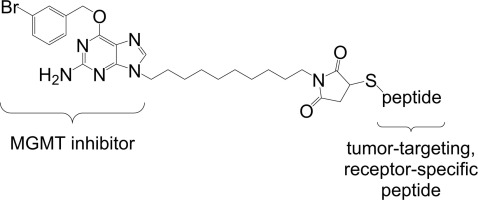Tetrahedron Letters ( IF 1.5 ) Pub Date : 2020-03-12 , DOI: 10.1016/j.tetlet.2020.151840 Björn Wängler , Ralf Schirrmacher , Carmen Wängler

|
In the therapy of cancer, alkylating agents are an efficient and often-used substance class. However, cells can repair the resulting alkyl modifications in the O6-position of guanine using the repair protein methylguanine methyltransferase (MGMT), giving rise to resistance and inefficient therapy. A possibility to overcome this resistance is the use of MGMT inhibitors as adjuvants to alkylating therapies. However, MGMT inhibitors also sensitize healthy cells towards alkylating therapies. A strategy to circumvent this is the development of tumor-specific inhibitors which could be based on peptidic ligands as carriers. Such constructs would enable a receptor-specific uptake into tumors. Furthermore, the MGMT inhibitors could be adapted to the respective tumor entity by changing the peptide carrier. However, no peptide-based tumor-specific MGMT inhibitors were described so far. Thus, we have developed a synthetic strategy to obtain covalent conjugates of receptor-specific peptides and O6-benzylguanine derivatives. As model compounds, the MGMT inhibitor O6-(3-bromobenzyl)guanine and the receptor-specific peptides c(RGDfK), TATE, PESIN, neurotensin-2656 and minigastrin-9 were chosen and successfully assembled to obtain potentially tumor-specific MGMT inhibitors. Both, the O6-(3-bromobenzyl)guanine as well as the peptide derivatives are easily replaceable during the syntheses to tailor peptide-based bioconjugates adaptable to the specific tumor entity.
中文翻译:

针对MGMT抑制剂的肿瘤特异性蓄积:针对抑制剂-肽缀合物的合成策略的首次描述
在癌症的治疗中,烷基化剂是一种有效且经常使用的物质。但是,细胞可以修复O 6中产生的烷基修饰使用修复蛋白甲基鸟嘌呤甲基转移酶(MGMT)将鸟嘌呤定位在鸟嘌呤上,引起耐药性和无效治疗。克服这种抗性的一种可能性是使用MGMT抑制剂作为烷基化疗法的佐剂。然而,MGMT抑制剂也使健康细胞对烷基化疗法敏感。规避这一问题的策略是开发肿瘤特异性抑制剂,该抑制剂可以以肽配体为载体。这样的构建体将使受体特异性摄取到肿瘤中。此外,MGMT抑制剂可通过改变肽载体而适应于相应的肿瘤实体。然而,到目前为止,尚未描述基于肽的肿瘤特异性MGMT抑制剂。因此,我们已经开发出一种合成策略来获得受体特异性肽和O 6-苄基鸟嘌呤衍生物。作为模型化合物,选择了MGMT抑制剂O 6-(3-溴苄基)鸟嘌呤和受体特异性肽c(RGDfK),TATE,PESIN,neurotensin-2656和minigastrin-9并成功组装以获得潜在的肿瘤特异性MGMT抑制剂。两者,所述ø 6 - (3-溴苄基)鸟嘌呤以及该肽衍生物是合成以适应于特定的肿瘤实体裁缝基于肽的生物共轭物过程中容易更换的。











































 京公网安备 11010802027423号
京公网安备 11010802027423号